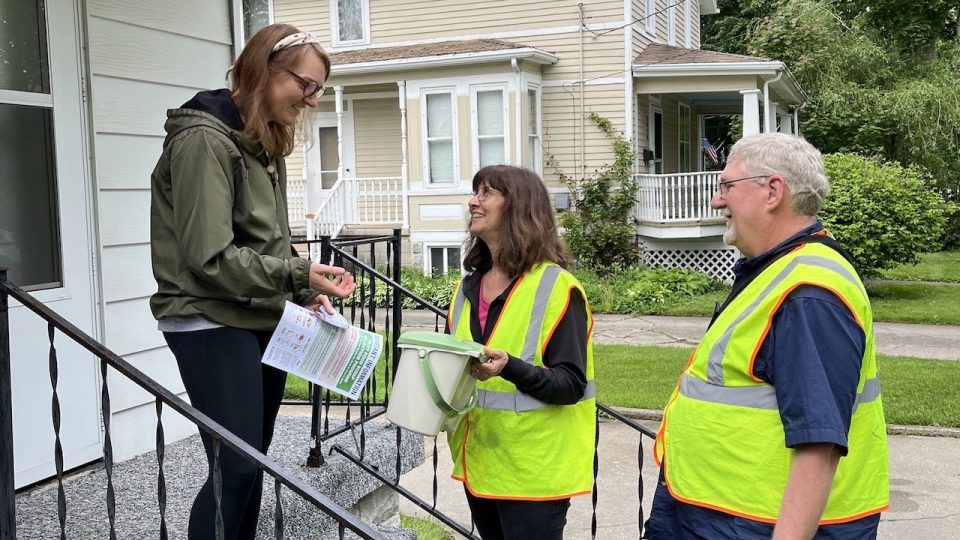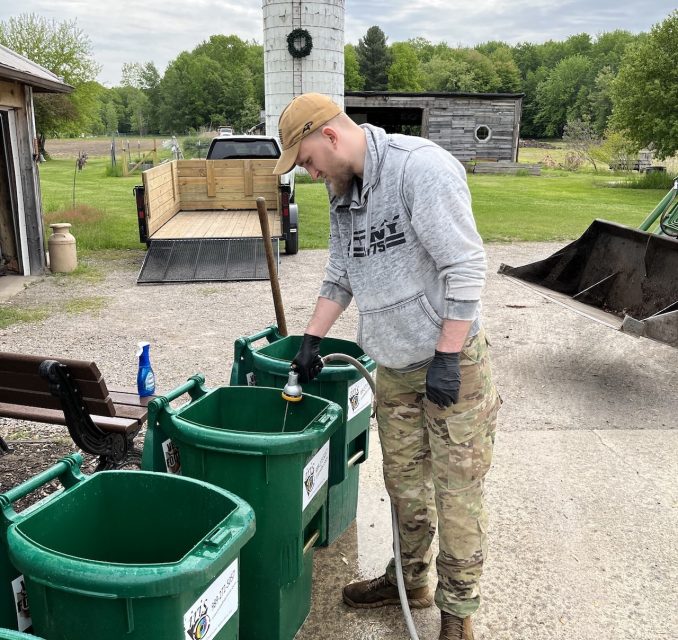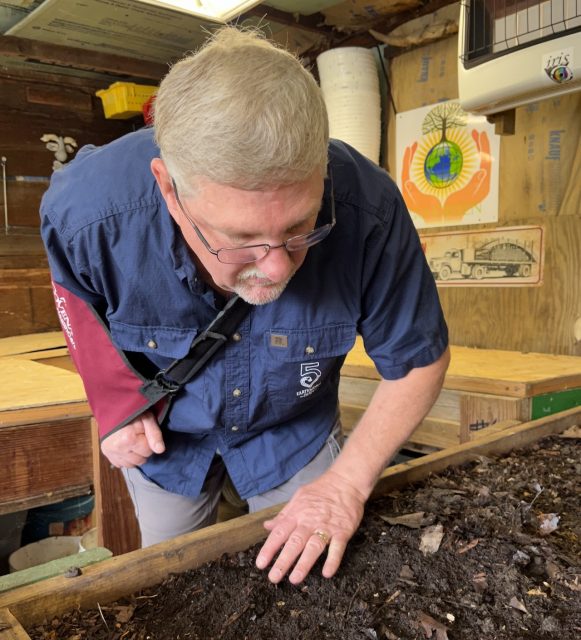
BAY CITY – Former high school science teacher, current online educator and avid gardener/composter Emily Piper recently moved from Phoenix to Bay City to be closer to her parents.
Piper unabashedly professes she is “wildly passionate” in her dedication to improving the environment and reducing, recovering and recycling wasted food while diverting those materials from landfills to prevent climate change.
“I grew up in the 1990s when everything was love the earth and conservation,” laughs Piper, who works as a content manager for Cambium Learning Group.
So she was eager to discover whether she could find the same top-quality composting and recycling convenience in Michigan she’d found while living in major metropolises around the U.S.
Turns out, Piper had nothing to worry about.
She learned about a new pilot food scrap collection program open to residents of Bay City and Saginaw created by Sarah Archer, the CEO of Iris Waste Diversion Specialists, Inc., with support from the Michigan Department of Environment, Great Lakes, and Energy (EGLE).
“I want to live in a sustainable way and reduce my impact on the environment,” Piper said.
“Composting conserves resources. I have big dreams and a small back yard that my dogs pretty much own, but I eventually plan to build a green house where I’ll grow vegetables, lettuce and other greens, all with compost that I’ll receive from Iris.”
How It Works

It’s easy and fast for Bay City and Saginaw residents to enroll in Iris’s food scrap collection program.
Iris also has a commercial food scrap collection in Genesee and Saginaw counties, where they currently travel onsite to retrieve food scraps from four businesses inside the Flint Farmers Market (Willow’s Garden Juice Bar, Penny’s Café, Flint Food Works, and Sweet Peaces Veggie Bistro), as well as the Flint Crepe Company, The Grafted Root in Grand Blanc and the House of Fortune in Saginaw.
“We’ve tried to make this experience simple, affordable and hassle-free,” Archer said. “We’re thrilled by the outpouring of support and sign-ups we’re getting from folks for both our commercial and residential food scrap collection services.”
Residential subscribers in Bay City and Saginaw can start by calling 855-2GO-ZERO (855-246-9376) or emailing info@iriswds.com to sign up. You can also visit www.iriswds.com for more details. Your personal information will remain confidential and will never be shared, Archer pledges. The monthly fee is $20.
Iris provides subscribers with two containers for managing food scraps. A kitchen pail is designed for countertop use when preparing food. When it’s full, you empty the contents of the kitchen pail into a 5-gallon bucket.
The 5-gallon bucket is to store food scraps between collection days. An easy-to-use lid is included with each bucket. The 5-gallon bucket is the container to set out on your pickup day, when Archer and her team arrive at your house or garage every week. Subscribers are responsible for maintaining the buckets’ cleanliness, but Iris also offers a swap-out service where they bring clean buckets for an extra $8 a month.
The scraps are delivered to 5Heart Earthworm Farm in Birch Run where Archer’s husband, Darrell Reed, processes the materials into worm castings, or manure. The worm castings are a natural alternative to fertilizer that improves soil health and boosts plant growth.

Subscribers agree to participate in three surveys providing feedback about the service through the duration of the pilot campaign, which ends Feb. 28, 2023.
And, as a “thank-you” for completing the surveys, subscribers will receive 30 pounds of worm castings in a 5-gallon bucket at the program’s conclusion. The worm castings can be safely used on all plants, trees, shrubs and lawns. Instructions are included. You also have the option of designating your bucket of castings to your city parks department.
Food for Thought
There are many ways for Michiganders to compost that are applicable beyond the Iris service footprint.
Among the tips that Archer recommends to all composters is storing scrap food buckets in a low-light, dry location to reduce odors. To absorb liquids and make bucket cleaning easier, place a sheet of newspaper at the bottom of the bucket before adding scraps. And to keep insects out of the bucket, always keep the lid on when not in use.
Types of food scraps that are ideal for composting include raw fruits and vegetables, coffee grounds and filters, tea leaves and natural tea bags, banana peels, eggshells and outdated leftovers — all with produce stickers, rubber bands and twist ties, which are nonrecyclable, removed. Meat, dairy, fats, oils and grease, as well as salty foods, should go in the garbage, not into food scrap bins.
In addition, by visiting EGLE’s Home Composting Guide, Michiganders can quickly become do-it-yourselfers and learn how to compost in their own backyard. They can also contact local municipal offices to find if there is a community garden nearby that takes food scraps and organic materials.
The idea of starting a compost pile at home or the workplace can be a little intimidating to newcomers, Archer concedes. That’s why the compost advocacy experts at Iris are so valuable.
“The most common mistakes we see are non-compostable materials like plastic bags and plastic knives and forks getting mixed in with the food scraps,” Archer said. “The beauty of subscribing to Iris is that if you’re still unsure about how to compost, you can store your organic materials until we pick them up each week and ensure that they find a better use than just sending it to the landfill.”
‘It’s Cool to Compost’
Before this year, residential food scrap diversion programs were non-existent in the largely rural Great Lakes Bay Region.
EGLE announced a $194,000 grant to Iris Waste Diversion Specialists in early 2022 to help expand its food scrap collection infrastructure and processing capabilities while establishing the residential pickup service in partnership with the cities of Saginaw and Bay City and with approval from the Mid-Michigan Waste Authority Board.
“This pilot project is a labor of love – we’re really excited to expand composting in the Great Lakes Bay region,” Archer said. “Our vision is to help people learn it’s cool to compost.”
Established in 2004, Archer’s company has achieved national certification as a Women’s Business Enterprise and as a woman-owned small business through the Women’s Business Enterprise National Council, the nation’s largest third-party certifier of businesses owned and operated by women in the U.S.
The Iris grant is part of EGLE’s strategy to promote composting as a way to prevent food waste such as kitchen scraps, leftovers and other organic materials from going into Michigan landfills.
Michigan saw a total of 51.1 million cubic yards of solid waste enter the 67 landfills across the state in 2021, according to the annual solid waste report EGLE released in May. Food waste represents roughly 30% of that total — about 15 million cubic yards — that could find a better use like composting.
Composting produces what gardeners call “black gold,” a nutrient-rich soil supplement that holds moisture and helps gardens grow. The activity is especially good for the environment. Unlike landfills that can release methane, a greenhouse gas that contributes to climate change, composting breaks down organic material without sending methane into the atmosphere.
"We're going to try to increase awareness about our program all summer," Archer said. "Not just our program, but composting in your backyard, if that's a better option for you.
“Our goal is to fill in the gap for people who can't compost outdoors. Not everyone can compost in their own yard. Someone who lives in a retirement home or an apartment complex may not have a yard, or may not have a yard where its conducive to composting. Our service provides them with an option to sustainably manage their food scraps."
































